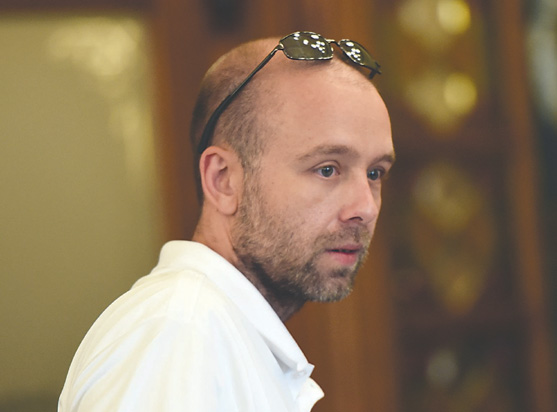By KATHRYNE RUBRIGHT
Staff Writer
Judge Reginald Routson on Monday rejected a Findlay man’s religious freedom argument against drug charges, but the judge did grant a stay of a two-year prison sentence in light of the man’s plan to file an appeal.
Matthew G. Cook, 36, pleaded no contest Monday in Hancock County Common Pleas Court to illegal manufacturing of drugs, a second-degree felony; aggravated possession of drugs, a third-degree felony; and possession of marijuana, a fifth-degree felony. The first two charges concern hallucinogenic mushrooms.
Cook pleaded no contest so that he can appeal issues in the case.
According to court documents, Cook is “a pastor and the only member” of the Church of Life, which he started.
During a search of his residence in August 2017, authorities found about 73 grams of mushrooms and 403 grams of marijuana, according to court documents. The search was conducted after an Adult Parole Authority officer saw a photo of Cook holding a mushroom on social media.
Cook had served time in prison for 2007 felony offenses of aggravated burglary, violating a protection order and attempted abduction.
Cook was sentenced Monday to two years in prison for the mushroom possession charge, and 11 months for marijuana possession, to be served concurrently. The two mushroom-related charges merged, and there is no separate sentence for the manufacturing charge.
Assistant Prosecutor Lora Manon did not object to the stay of the sentence. She had recommended a community control sentence, with a reserved two-year prison term.
Last Friday, Cook — not his lawyer — filed a new motion to suppress evidence and statements and dismiss the indictment against him, arguing that the “substance and nature of the charges in the indictment are prejudicial to Mr. Cook’s religious beliefs, and the evidence was collected in violation” of his rights under the U.S. Constitution, Ohio Constitution and the Religious Land Use and Institutionalized Persons Act.
Cook’s attorney, Robert Miller, said Monday the filing was “somewhat redundant,” given Cook’s previous motions. Routson and Manon also felt Cook’s Friday motion relied on the same earlier arguments, and Routson said he would not consider it.
Before he was sentenced, Cook gave a statement about his religion and his improved mental health, saying he has made mistakes but has made “every effort to rehabilitate” himself and has “succeeded greatly.”
Religious figures like Moses, Buddha and Jesus were not “accepted at their time, at their hour. They were all considered to be outcasts, as I am,” Cook said.
In asking for a stay, Miller said Cook believes “these charges violate his religious beliefs.”
On changing laws about marijuana — and, in a few cities, mushrooms — Miller said, “the wave is coming, but it’s not here yet. That being said, I think it would be somewhat of a travesty to impose a prison sanction knowing that potentially, possibly, laws could change” during the appeal process.
In May 2018, Cook filed both a motion to dismiss all charges against him, and a motion to suppress evidence found during what he called an “unconstitutional search” of his residence, as well as statements he had made.
The motions to dismiss and suppress included the same reasoning.
Responding last August to Cook’s motion to dismiss, Manon wrote that while there are reasons an indictment can be dismissed, they don’t apply to Cook’s situation.
In a January decision, Judge Routson agreed there was no reason to dismiss the indictment.
Cook’s motions noted an exemption allowing the use of peyote, a hallucinogenic Schedule I drug, by Native Americans.
He argued that the Hancock County Common Pleas Court should grant him religious exemption because of “the specifics of this case and the changing attitude toward marijuana.”
Cook also argued that the government doesn’t have a “compelling interest” to regulate marijuana, and that opinions denying religious use of marijuana were “made during a time where the United States was largely uniform with regards to its opinions on marijuana and the compelling government interest in heavily regulating its use.”
Today, Cook wrote, “recent research shows that marijuana is not as dangerous as it was once believed, and in fact has medicinal properties.” States including Ohio have legalized medical marijuana, and a smaller number of states have approved recreational marijuana.
But none of that means the evidence found at Cook’s residence should be suppressed, Manon argued.
“Neither does the concept of legalizing marijuana and the relaxing of laws regulating the possession of that particular substance support the defendant’s contention that his constitutional rights were violated,” she wrote.
Routson rejected what he called Cook’s request for him “to legislate from the bench and expand the case law to protect his possession of marijuana.”
As to mushrooms, Routson said Cook’s “reliance” on the Religious Freedom Restoration Act of 1993 was “ill placed” because it applies to the federal government, not state governments.
Cook cited that law, and the First Amendment, in “do not enter” signs posted on two refrigerators at his residence.
Cook wrote that the court should find his beliefs “are religious in nature and are sincerely held.”
He said that he, along with “members of Rastafarian and the Oklevueha Native American Church, believe that consumption of marijuana in a controlled environment provides spiritual experience and healing as well as the consumption of psilocybe mushrooms to attain a higher consciousness and communicate with God, or spirit.”
Manon was doubtful of this, writing that Cook “is simply seeking to be a law unto himself, and to have the court’s blessing to continue violating the law without having any consequences.”
Cook’s beliefs are not “truly held,” she wrote, adding “the state suggests that the defendant’s beliefs are simply a ruse.”
Routson found that Cook’s religious beliefs are “sincerely held” — but that in his opinion, Cook’s “beliefs as to his consumption of psychedelic mushrooms is an attempt to justify his otherwise illegal actions.”
Rubright: 419-427-8417
Send an E-mail to kathrynerubright
Twitter: @kerubright
